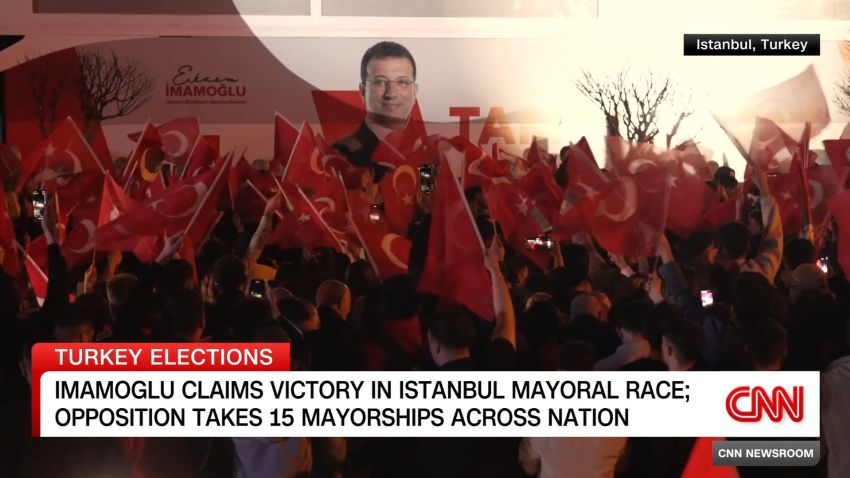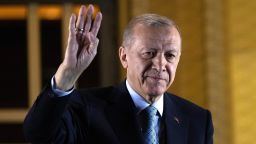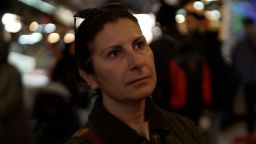Editor’s Note: A version of this story appears in CNN’s Meanwhile in the Middle East newsletter, a three-times-a-week look inside the region’s biggest stories. Sign up here.
Turkey’s local elections on Sunday marked the biggest election defeat for President Recep Tayyip Erdogan’s Justice and Development (AK) Party, as the main opposition group claimed victory in key cities including Istanbul and Ankara.
Turkey held nationwide elections on Sunday for city mayors, district mayors, and other local officials who will serve for the next five years. Erdogan’s party lost the popular vote for the first time since it started running for elections in 2002, and it lost regions that had previously been considered AK Party strongholds.
“It is the biggest defeat,” said Murat Somer, professor of political science and international relations at Ozyegin University in Istanbul. It is a defeat not only in numbers, he said, but also because “Erdogan had used all state power” at his disposal to try to help his party win the elections.
The setback for the AK Party came almost a year after Erdogan was re-elected as president in a knife-edge May election, defeating opposition leader Kemal Kilicdaroglu in a close runoff vote. After his presidential victory, Erdogan had his sights on reclaiming cities lost to the opposition in 2019.
Preliminary official results showed the opposition Republican People’s Party (CHP) had won 35 out of 81 municipalities including 14 out of 30 urban areas in the country, Turkey’s High Electoral Council said.
With 99.8% of the votes counted, unofficial results showed Erdogan’s chief political rival Ekrem Imamoglu of the CHP re-elected as mayor of Istanbul with 51.1% of the votes, according to state broadcaster TRT. Nationwide, the CHP won the most votes, with 37.7%.
In the capital, Ankara, CHP candidate and incumbent mayor Mansur Yavas secured 60.4% of the vote. In Izmir, the CHP’s Cemil Tugay won with 48.9% of the vote.
“The period of one-man rule is over today,” Imamoglu, a 53-year-old businessman-turned-politician, told cheering crowds in Istanbul on Sunday night.
“As we celebrate our victory, we send a resounding message to the world: the decline of democracy ends now,” the Istanbul mayor wrote Monday on X. “Istanbul stands as a beacon of hope, a testament to the resilience of democratic values in the face of rising authoritarianism.”
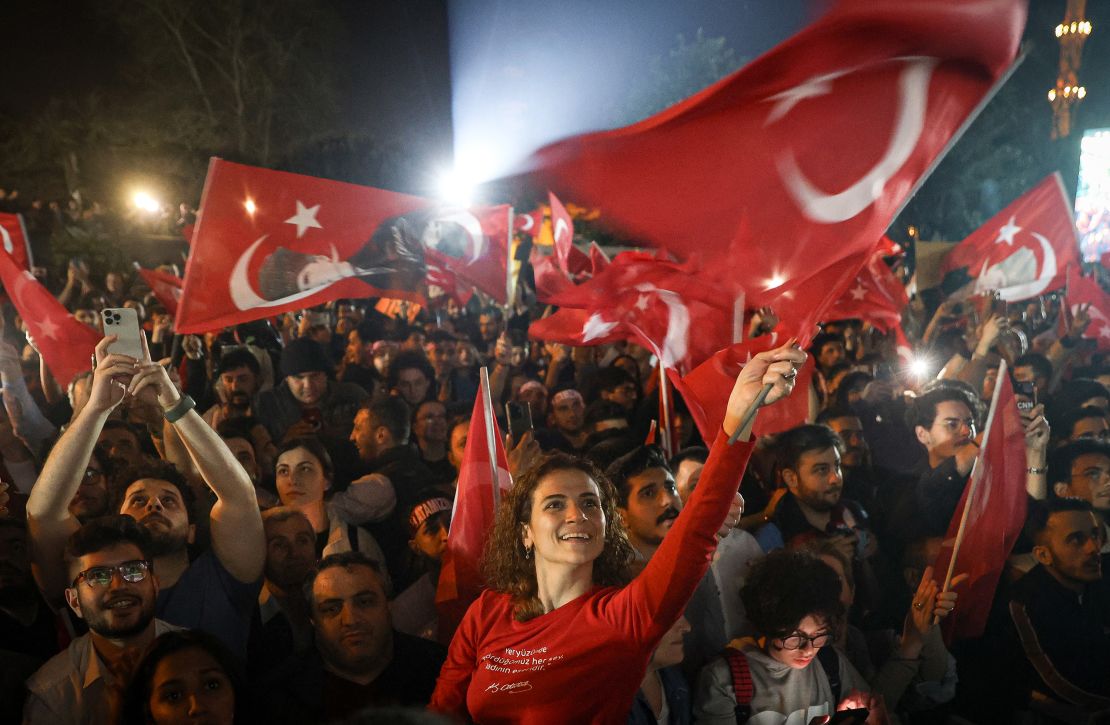
For Erdogan, Istanbul is a strategic and personal crown jewel that he was determined to take back in Sunday’s election. The city was for 25 years run by religiously inclined parties – first by the Welfare Party, of which Erdogan was a member, and then by the AK Party – until the secular CHP won its mayorship in 2019 under Imamoglu.
The AK Party lost 10 Istanbul districts to rivals in the latest election. Beyoglu, the district of Istanbul where Erdogan was born, was lost to the CHP.
A ‘formidable opponent’
Erdogan was not a candidate in this election, but the vote was largely seen as a test of whether the AK Party could win back the cities it lost in the 2019 elections.
Imamoglu won by a comfortable margin in Sunday’s vote, a race in which Erdogan himself played a big role. The president’s face was plastered across billboards and banners alongside those of the local candidates, and he held election rallies in Istanbul in the final few days of the campaign.
Now, Erdogan not only has fewer AK Party-aligned local governments to rely on, but also has a potential challenger in the next presidential contest whose clout and popularity just got a lot bigger.
“I would say that Imamoglu would be a very formidable opponent,” Ahmet Kasim Han, a political scientist at Beykoz University in Istanbul, told CNN ahead of the vote, adding that Imamoglu was “basically running against all odds this time.”
Born in a small village in the Anatolian Erzincan province, Imamoglu became Istanbul’s 32nd mayor in 2019. He ran as a prospective vice president to opposition candidate Kilicdaroglu in last year’s presidential election.
Erdogan conceded defeat on behalf of his party Sunday night, saying he plans to respect the will of Turkish people.
“Unfortunately, we could not get the result we wanted and hoped for in the local election test,” the 70-year-old leader said in a speech delivered Monday at AK Party headquarters in Ankara. Regardless of the results, he added, “the winner of this election is primarily our democracy, the national will, and all 85 million people, regardless of their political views.”
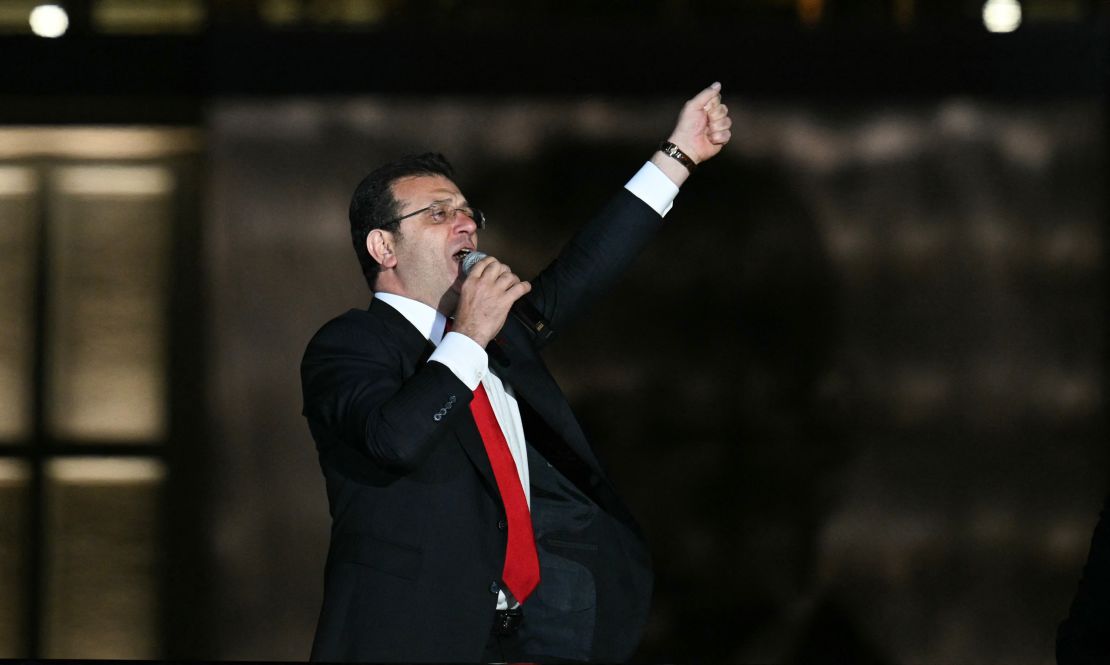
Economic downturn
Sunday’s results are “a red card” for Erdogan and his policies, Somer told CNN. “He seems to have been out of touch with the people,” he said of the president, and had an advantage over opponents as state officials, funds and the media were all mobilized in his favor. That, Somer said, “created a sense of injustice among voters.”
As election results poured in, Erdogan said he intended to dissect the reasons for his loss.
“Wherever we lose or fall behind, we will identify the reasons very well and make the necessary interventions,” he said.
Sunday’s vote took place amid an economic downturn that has continued despite Erdogan’s apparent shift towards more mainstream economic policies after his re-election in May.
The return of Mehmet Simsek as finance minister in his new cabinet was largely seen as a positive move for the trillion-dollar economy.
Inflation in Turkey remains high, however, and the lira continues to plummet. Official figures show prices rose 67% in February compared with the same time last year, although unofficial estimates suggest the real figure is north of 100%.
Inflation has persisted despite the Turkish central bank hiking interest rates to 45% in January — up from a low of 8.5% a year ago.
Speaking to AK Party supporters Monday, Erdogan said he intended to focus on reviving the economy over the next four years.
“We will focus more on the urgent issues of our country, especially the revival of the earthquake zone and the elimination of our economic problems,” Erdogan said. “We will start to see the positive results of our economic program, especially inflation, in the second half of the year,” he said, alluding to a medium-term economic plan proposed by Simsek in September which aims to curb inflation.
CNN’s Mohammed Tawfeeq contributed to this report.
Correction: This article has been updated to correct the number of municipalities won by the opposition.


